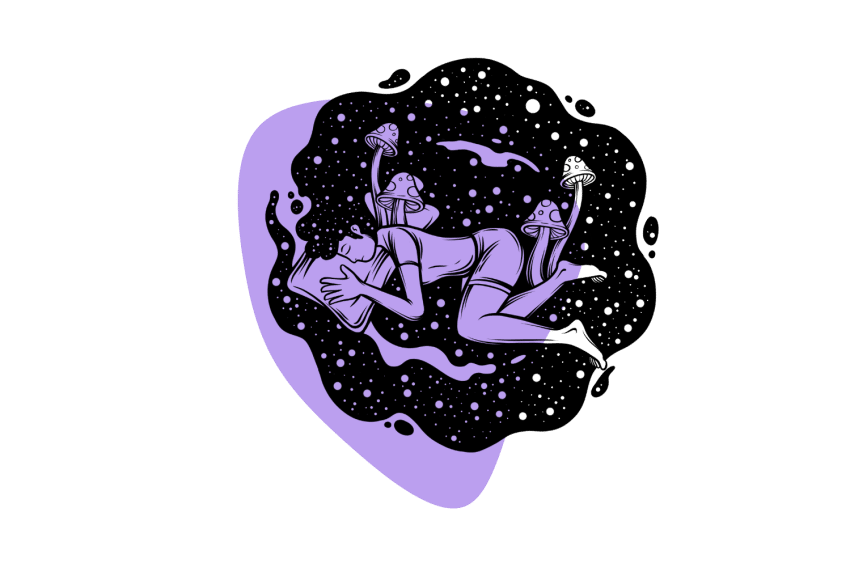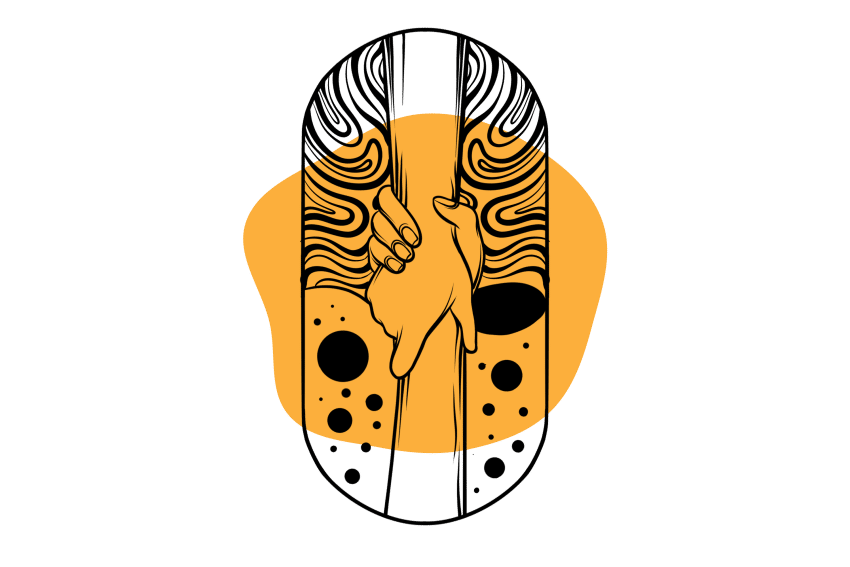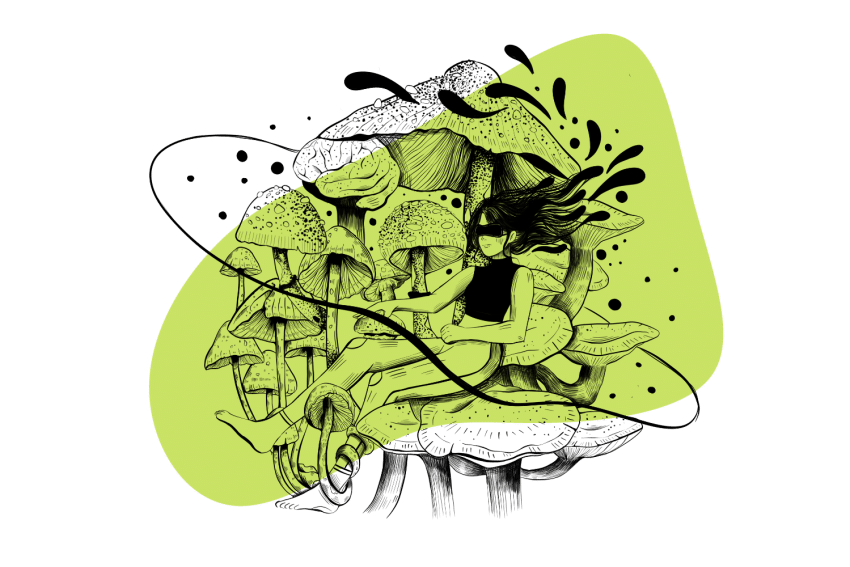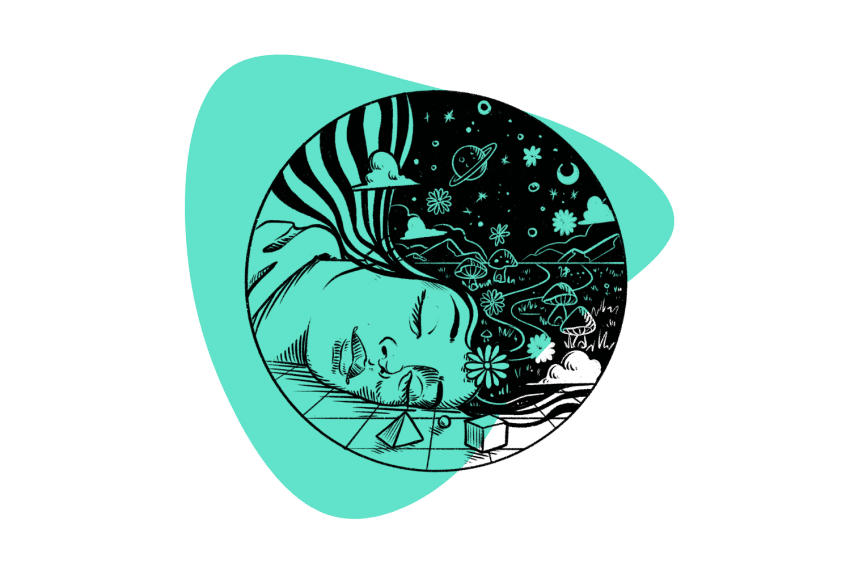What Are Psychobiotics?
Psychobiotics are probiotics that provide additional brain benefits courtesy of a very special bond between our gut and our mind.
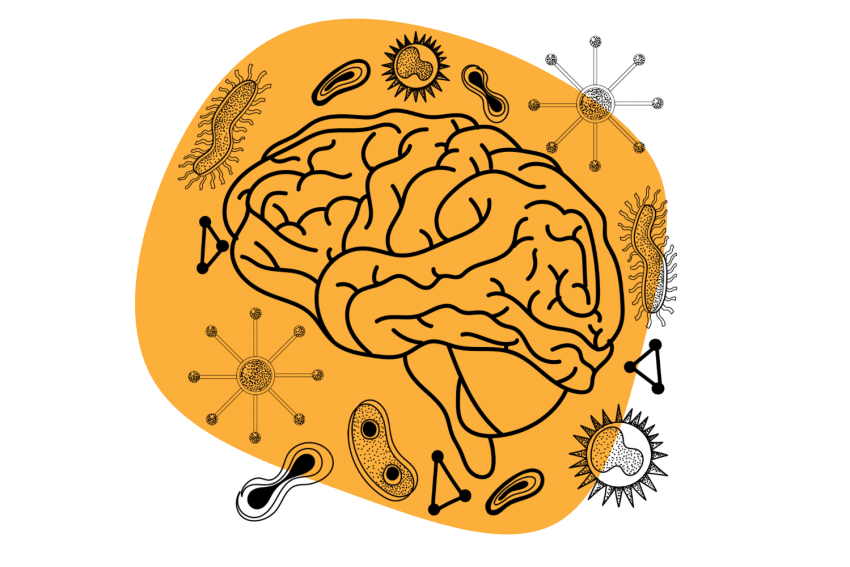
Within our gut lies a plethora of bacteria that guide many essential bodily functions.
We already know that supporting these bacteria improves digestion and overall health — but research is starting to show a direct benefit to brain function.
Certain bacteria seem to be better than others at supporting the connection between the gut-brain axis, and some may even promote a calmer demeanor to life.
Let’s discuss how this might be the case and break down the many ways bacteria support and uplift us.
What Are Psychobiotics?
Psychobiotics are specific species of bacteria that support brain function.
Certain strains of Lactobacillus, Bifidobacterium, and Escherichia coli have been shown to impact brain function.
Psychobiotics are essentially a probiotic (a supplement that introduces) psychobiotic bacteria.
This differs from prebiotics, which provide certain types of fibers the target bacteria feed on.
How Psychobiotics Work
A remarkable amount of your life experience is dependent on the bacteria residing in your gut. There are a few different reasons for this, and the mechanisms aren’t entirely understood, but one thing is certain: there is much more to the gut than digestion.
Some have even described the delicate balance between the gut and the brain — the microbiome-gut-brain axis — as a “second brain” in our stomach.
Here’s how it works.
The Microbiome & the Gut-Brain Axis
When you think of the “location” of your consciousness, you likely first think of your brain. Something people often overlook about the human body is how much of it is incomplete on its own.
Bacteria help us to process foods we couldn’t otherwise eat, provides us with nutrients we wouldn’t otherwise make, and fights against infections we couldn’t survive on our own. Our lives are dependent on the symbiotic relationship we’ve formed with bacteria.
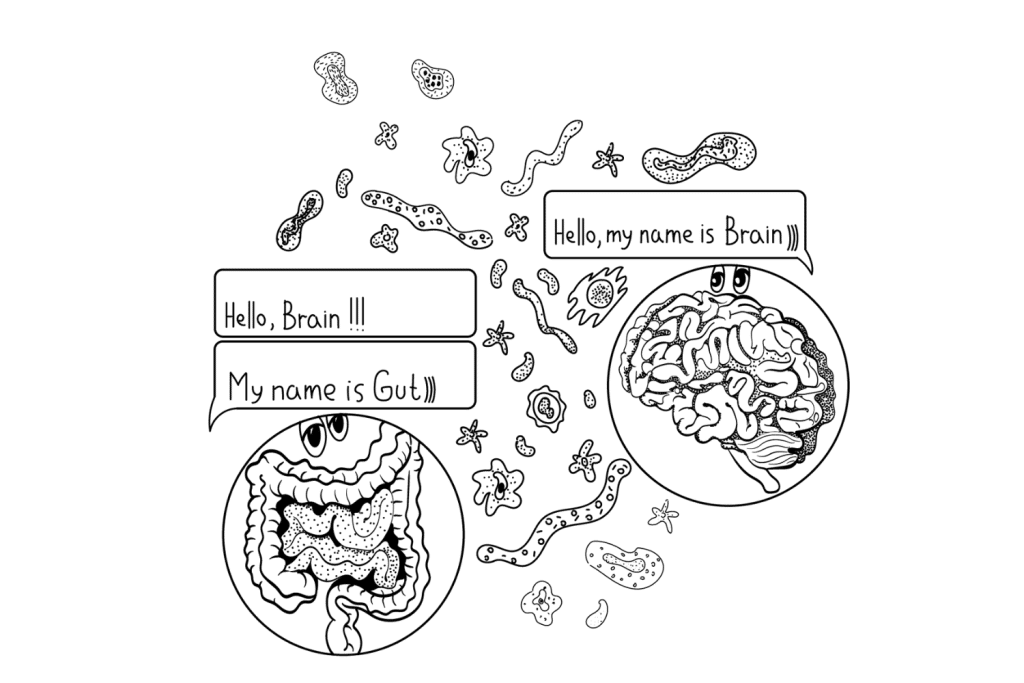
Some calculations state the bacteria in our body could make up as much as 4.5 lbs of our total weight [1]. Along with the physical functions we rely on, it seems as though our total makeup of bacteria — or microbiome — may even determine our mood and mental health.
There is a connection between this microbiome, our gut, and our brain, which is not yet fully understood. Research shows some interactions occur “bidirectionally” — or in both directions — between the two [2].
I would be stating the obvious if I said that different parts of the body communicate to and from the brain. Still, something is very particular about how the microbiome and the brain communicate together — there’s essentially a third-party communicating with unconscious parts of our brain.
This isn’t the receptors in your own ear picking up on vibrational changes in the air; it’s living bacteria pulling levers to tell your brain what it needs to control its optimal living condition (which happens to be your body).
How the Brain Communicates with the Gut
There are quite a few studies on the effects of the brain on a person’s microbiome. One study showed stress can increase “visceral sensitivity.”
This refers to the level of pain and sensitivity a person feels in their visceral organs — or the soft organs within the torso. Increased sensitivity can lead to inflammation, higher levels of pain, and abdominal discomfort [3].
When this builds, it’s only natural for stress, irritability, and anger to rise with it. One study found meditation paired with a vegan diet improved the health of the microbiome [4].
It seems most people can empathize with the intense levels of anxiety felt in the gut. Chronic anxiety and the heightening of the conditions affecting the microbiome could lead to major, chronic health problems.
How the Gut Communicates With the Brain
The expression “you are what you eat” finds its root in the gut’s effect on our mood and mental health. It is true to state the nutrients, bacteria, and vitamins we take in make up a large portion of our mentality.
Improving the health of our gut should, therefore, boost the health of our mind as well. At least one study supports this, suggesting that taking a probiotic could have beneficial effects on treating depression [5].
Another easy way to help reinforce your microbiome is through breathwork, meditation, and other calming activities. Reducing stress levels can keep your brain from sending the wrong signal to your gut.
The Benefits of Psychobiotics
The main reason people turn to psychobiotics is to improve mental health. Proponents of the supplements claim they can help lower anxiety levels and increase their capability for patience and happiness.
Since all psychobiotics are also probiotic supplements, they are often helpful for a variety of other health benefits. These include:
- Digestion — Like prebiotics, probiotics are helpful for the microbiome of the intestines, improving digestion.
- Cognitive Disease — Some research suggests psychobiotics could be helpful for cognitive diseases like Alzheimer’s.
- Immune System — Psychobiotics may boost the immune system and help your body fight off disease and illness.
- Heart disease — Research shows psychobiotics may lower the risk of heart disease in users.
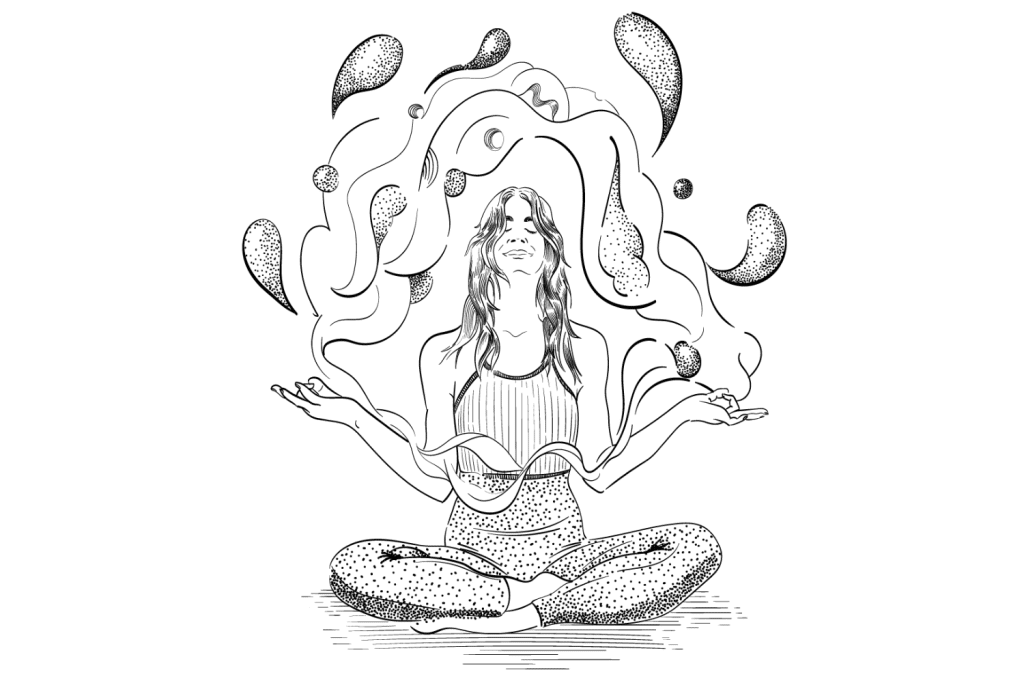
While research is starting to support these claims, it’s important to note it is far from conclusive. Much of the experience people have with psychobiotics is relative and subjective.
Each person is different, and everyone has different needs with their body — microbiomes are no different.
Still, the science surrounding the issue is promising, and researchers are coming around to the potential for the anxiolytic and antidepressant effects of psychobiotics [6]. Time will tell whether this claim sticks, but in the meantime, there are many personal testimonies worth considering.
Top 3 Most Popular Psychobiotics
While psychobiotics are a relatively new concept, and there are many options to choose from, making it difficult to know where to start. There are many considerations, and it’s important to do your research before deciding on any route forward.
Among the many options out there, here are the three most common species of psychobiotics people turn to:
1. Bifidobacterium longum
B. longum is a probiotic showing promising results in research around inflammatory bowel disease (IBD) [7]. This study shows the “chronic and recurrent inflammation in the gastrointestinal tract” that defines IBD lowers after introducing this bacteria.
In addition to the physical benefits of B. longum, some research shows the potential for its ability to modulate stress [8]. Though this was a rodent study, many report success in this regard from their personal use as well.
2. Lactobacillus rhamnosus
This is one of the most common varieties of probiotics and has numerous potential applications. As far as physical health effects, research supports this as helpful in preventing diarrhea and gastrointestinal concerns while bolstering the immune response [9].
Since this probiotic is so common, it has been the subject of a plethora of research. Other claims for potential benefits include:
- Treatment of Irritable Bowel Syndrome (IBS) — Since IBS is a condition with a potential link to the microbiome of those affected, bolstering the gut flora could help relieve symptoms.
- Treating Acne — This comes from a small study, but it found this bacteria could potentially help reduce acne. Of the 10 participants who took the probiotic, 6 saw improvement [10].
- Preventing Urinary Tract Infections (UTIs) — Some studies show this bacteria helps kill off harmful bacteria and supports the flora of bacteria in the vagina.
- Promoting Weight Loss — Some research supports L. rhamnosus suppressing food cravings and appetite.
- Prevention of Cavities — The root cause of cavities is bacteria, and this probiotic could prevent its build-up within the gums.
- Increasing Sensitivity to Insulin — Several animal studies suggest this bacteria can help with blood sugar control and increase sensitivity to insulin.
When it comes to the psychobiotic potential of L. rhamnosus, research is currently conflicting and underwhelming. One rodent study found an increase in GABA — a neurotransmitter which, in high doses, causes a calming effect — in the group of mice that took L. rhamnosus vs. the placebo group [11].
Another small human study found it “was not superior to placebo in modifying stress-related measures [12].” Though it’s worth noting that the group had only 29 people — of which 15 were taking a placebo.
3. Lactiplantibacillus plantarum
Similar to the above, L. plantarum can increase GABA production, “which alleviates hypertension, depression, and sleepiness in humans. [13]” Additionally, this bacteria can help with physical conditions such as IBS “mainly due to normalization of stool and relief of abdominal pain [14].”
Note: The genus of this species was recently split into 25, and, as a result, the name changed from “Lactobacillus plantarum” to “Lactoplantibacillus plantarum.”
Potential Concerns with Probiotics
Probiotics are safe for the vast majority of the population. Everything points towards this being true for those acting as psychobiotics and those not.
The most common negative experiences are constipation, gas, and bloating. A fair amount of people also experience increased thirst when taking probiotics.
A small population of people may have allergic reactions to the ingredients in probiotic supplements as well.
Here are common allergens in some probiotics:
- Dairy
- Egg
- Soy
- Yeast
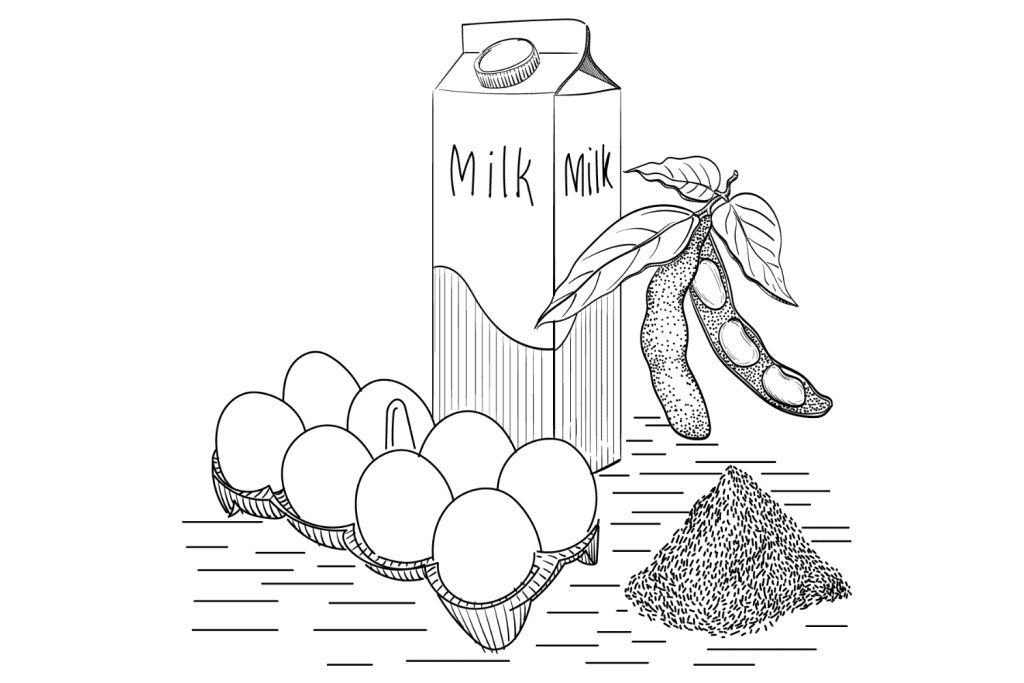
In rare cases, susceptible individuals have gotten infections from the bacteria in probiotics after it has entered their bloodstream. If you have a lowered immune system or if you are recovering from a recent procedure, you should avoid taking prebiotics or probiotics.
Though typically treated easily with antibiotics, deaths have resulted from these infections in the past. If you develop any adverse reactions to your probiotic, stop using it immediately and seek medical care if necessary.
Conclusions: Do Psychobiotics Work?
The connection between our brain and gut is still mostly unknown. We understand it is important, and it guides many of our experiences in life, but we’re still unsure how to master it.
Research into psychobiotics seems promising, and the anecdotal reports certainly back them up. It should come as no surprise that healthy gut balance results in a better and happier life.

After all, we’ve promoted this through healthy eating and exercise for years. The goal is the same for both — support your body and give it the nutrients it needs to function smoothly.
If you don’t feel comfortable sourcing a pill to support your microbiome, you can always do so through clean eating and good, old-fashioned cardio. Even if you do this, it’s likely still beneficial to support your gut with reaffirming bacteria.
If you choose to take a psychobiotic, research the bacteria you would like to go with along with the company you’re choosing. Since these products all fall under the wildly under-regulated “supplement” category, knowing you can trust your vendor is important.
No matter how you do it, taking care of your gut health will always pay substantial dividends. Supplements like psychobiotics may or may not be for you, but everyone should practice eating healthier foods, getting exercise, and quieting their mind whenever possible.
Remember, if you don’t do it, some other living being within you might.
References
- Sender, R., Fuchs, S., & Milo, R. (2016). Revised estimates for the number of human and bacteria cells in the body. PLoS biology, 14(8), e1002533.
- Martin, C. R., Osadchiy, V., Kalani, A., & Mayer, E. A. (2018). The brain-gut-microbiome axis. Cellular and molecular gastroenterology and hepatology, 6(2), 133-148.
- Aguilera, M., Vergara, P., & Martínez, V. (2013). Stress and antibiotics alter luminal and wall‐adhered microbiota and enhance the local expression of visceral sensory‐related systems in mice. Neurogastroenterology & Motility, 25(8), e515-e529.
- Jia, W., Zhen, J., Liu, A., Yuan, J., Wu, X., Zhao, P., … & Xu, A. (2020). Long-term vegan meditation improved human gut microbiota. Evidence-Based Complementary and Alternative Medicine, 2020.
- Kim, C. S., & Shin, D. M. (2019). Probiotic food consumption is associated with lower severity and prevalence of depression: a nationwide cross-sectional study. Nutrition, 63, 169-174.
- Sarkar, A., Lehto, S. M., Harty, S., Dinan, T. G., Cryan, J. F., & Burnet, P. W. (2016). Psychobiotics and the manipulation of bacteria–gut–brain signals. Trends in neurosciences, 39(11), 763-781.
- Yao, S., Zhao, Z., Wang, W., & Liu, X. (2021). Bifidobacterium longum: protection against inflammatory bowel disease. Journal of Immunology Research, 2021.
- Allen, A. P., Hutch, W., Borre, Y. E., Kennedy, P. J., Temko, A., Boylan, G., … & Clarke, G. (2016). Bifidobacterium longum 1714 as a translational psychobiotic: modulation of stress, electrophysiology and neurocognition in healthy volunteers. Translational psychiatry, 6(11), e939-e939.
- Segers, M. E., & Lebeer, S. (2014). Towards a better understanding of Lactobacillus rhamnosus GG-host interactions. Microbial cell factories, 13(1), 1-16.
- Fabbrocini, G., Bertona, M., Picazo, Ó., Pareja-Galeano, H., Monfrecola, G., & Emanuele, E. (2016). Supplementation with Lactobacillus rhamnosus SP1 normalises skin expression of genes implicated in insulin signalling and improves adult acne. Beneficial microbes, 7(5), 625-630.
- Janik, R., Thomason, L. A., Stanisz, A. M., Forsythe, P., Bienenstock, J., & Stanisz, G. J. (2016). Magnetic resonance spectroscopy reveals oral Lactobacillus promotion of increases in brain GABA, N-acetyl aspartate and glutamate. Neuroimage, 125, 988-995.
- Kelly, J. R., Allen, A. P., Temko, A., Hutch, W., Kennedy, P. J., Farid, N., … & Dinan, T. G. (2017). Lost in translation? The potential psychobiotic Lactobacillus rhamnosus (JB-1) fails to modulate stress or cognitive performance in healthy male subjects. Brain, behavior, and immunity, 61, 50-59.
- Kim, J., Yoon, Y. W., Kim, M. S., Lee, M. H., Kim, G. A., Bae, K., & Yoon, S. S. (2022). Gamma-aminobutyric acid fermentation in MRS-based medium by the fructophilic Lactiplantibacillus plantarum Y7. Food Science and Biotechnology, 31(3), 333-341.
- Kaźmierczak-Siedlecka, K., Daca, A., Folwarski, M., Witkowski, J. M., Bryl, E., & Makarewicz, W. (2020). The role of Lactobacillus plantarum 299v in supporting treatment of selected diseases. Central European Journal of Immunology, 45(4), 488-493.

